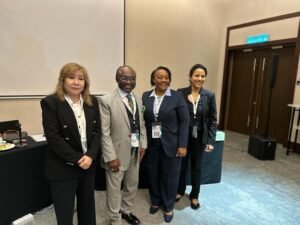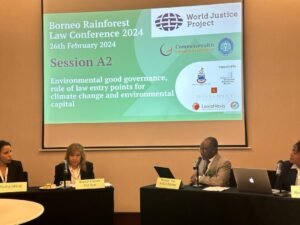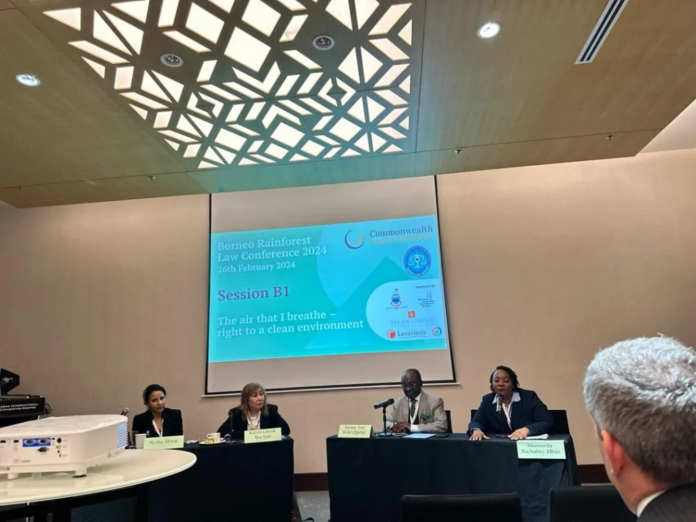Director of Ghana School of Law Chairs a Session of Borneo Rainforest Law Conference 2024, Advocating for Environmental Good Governance.
In a groundbreaking initiative towards environmental justice, Nana Barima Yaw Kodie Oppong, the Director of the Ghana School of Law, took center stage as the Chairman of a Session of the Borneo Rainforest Law Conference 2024.

Held from 26th February at the Sabah International Convention Centre in Kota Kinabalu, Sabah, Malaysia, the conference, co-hosted by the Commonwealth Lawyers Association (CLA) and the Sabah Law Society (SLS), brought together legal minds to delve into pressing issues of climate justice, human rights, funding, constitutionalism, and action within legal and governmental frameworks with the United Nation’s recently recognised environmental right as Human Right as the focal point of the discussion.
Nana Barima Kodie Oppong, serving as the Chair of the Papers Committee, demonstrated his expertise in legal matters by moderating a session on Monday, 26th February 2024, under the theme “The air that I breathe – right to a clean environment.” The session focused on the emerging recognition of the right to a clean, healthy, and sustainable environment as a fundamental aspect of human well- being and sustainable development.

In his preliminary remarks, Nana Barima Kodie Oppong asserted that long before the UN declaration of environmental right as human right Ghana’s Constitution established in 1992 had incorporated in it the recognition of right to a sustainable environment as a right worthy of protection. He relied on Art. 36 (9) of the Constitution to drive home the point. It states:
“The State shall take appropriate measures needed to protect and safeguard the national environment for posterity; and shall seek co-operation with other states and bodies for purposes of protecting the wider international environment for mankind.”
He however juxtaposed the above against other laws and policies that require extraction of natural resources for the advancement of human capital and economic development.
Based on the above competing interests, Nana Barima underscored the need to find a balance in the face of this real conundrum staring at many countries where the extraction of their natural resources such as oil and gas and minerals has become imperative for the development of human capital and economic growth vis-à-vis the need to protect the environment, especially for the next generation.
He delicately illustrates this point with reference to the discovery of oil and gas in commercial quantities by Ghana in the year 2007 and its extraction since then which according top credible report, Ghana earned US$540,456,124 in the first half of 2023, and US$1.43 bn. in the year 2022. According to the Government part of such revenues are been applied to fund the flaship programme dubbed “Free Education” which has enabled over a million children to access free secondary education.
He was however quick to emphasize the fact that the extraction of these natural resources can potentially cause havoc to the environment thereby endangering the lives of the very people for whose benefit the natural resources are to be extracted. He therefore advocated for the application of a balancing act so that we can get the benefits accruable from both ends. That is: the extraction of minerals for economic development and at the same time enjoying a safe, healthy and sustainable environment.
With this background, he set the ball rolling by inviting the panellists to focus on a number of key points including:
A. The Significance of the Right to a Healthy Environment, providing insights into global trends and initiatives.
B. The importance of environmental rights in the context of economic development, emphasizing the interconnectedness of environmental, social, and economic well-being.
C. Case studies highlighting successful approaches to balancing economic growth with environmental sustainability, showcasing innovative solutions and best practices.
D. Challenges and obstacles faced in achieving this balance, including regulatory barriers, resource constraints, and competing interests.
E. Opportunities for collaboration between stakeholders to promote sustainable development, emphasizing the role of partnerships, multi-stakeholder engagement, and community involvement.
The Director, alongside notable figures such as Nesha Abiraj (Co-Executive Director, Climate Right and Justice International), Karen Cheah Yee Lynn (President, Malaysia Bar), and Nkusuwila Nachawle-Mbao (Nkusuwila Nachawle Advocates), explored the intricate relationship between environmental degradation and the enjoyment of fundamental human rights. Emphasizing the intrinsic connection between environmental integrity and human dignity, Barima Kodie Oppong highlighted the moral imperative to safeguard the environment for present and future generations.
One of the pivotal moments of his remarks is his rendering, with modification, the age-old adage “where you live should not determine whether you live” re-echoing the global challenges of pollution that disproportionately affect women in particular as noted by the panelists. Stressing the need to balance economic growth with environmental protection, he emphasized the urgency of finding sustainable solutions.
Nana Barima Kodie Oppong outlined key strategies for addressing environmental challenges, including:
.Creating awareness
Strengthening the judiciary to impose enhanced deterrence measures and custodial sentences where necessary,
.Enhancing continuing legal training,
.Fashioning and implementation of a Commonwealth Action Plan,
.Esuring mutual legal assistance
promoting the emancipation of minds on environmental matters,
.A robust Legal Aid policy
As an expert in legal matters, Nana Barima Kodie Oppong’s leadership at the Borneo Rainforest Law Conference 2024 showcased a commitment to fostering environmental good governance and leveraging the rule of law as an entry point for addressing climate change and environmental capital. His insights echoed a resounding call for global collaboration to forge a path towards a greener, more equitable, just and prosperous future for all.

